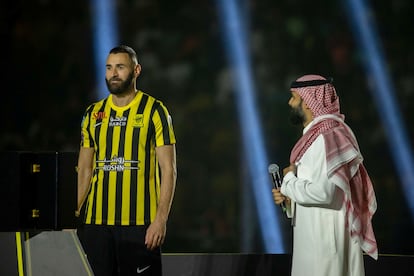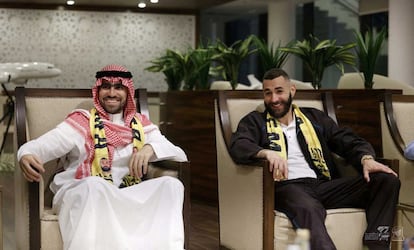Saudi Arabia: Soccer, power and sportswashing
Riyadh’s aggressive transfer policy, which has already landed Cristiano Ronaldo and Karim Benzema, is a weapon to promote the country and try to improve the international image of its leadership

Mohammad al-Shakhouri barely had any teeth left on March 12, 2022, the day he was brought before the executioner. They had been punched out during interrogation, Amnesty International said. A Saudi citizen, al-Shakhouri had been sentenced to death for participating in a demonstration, and he 80 other men were beheaded in Saudi Arabia, a country that has been making headlines for the past two weeks. Not for the hard work of their executioners, or for the trampled rights of women, LGTBI+ people and immigrants, but over the signing of Karim Benzema by Al-Ittihad on a deal worth $107.6 million per season, a figure from another galaxy that can only be competed against in that corner of the planet. Cristiano Ronaldo signed for Al-Nassr in January for twice that much and although Leo Messi ended up opting for Inter Miami after leaving PSG, it was not before he had been offered over $400 million a season to join Al-Hilal.
This aggressive recruitment policy, unprecedented in soccer, is the ultimate expression of the Saudi Arabian rulers’ plans to turn sport into a weapon to promote the country, to win over its citizens, to try to whitewash itself overseas in the face of the repression it exercises over any kind of opposition, and to assert its power on a global scale.
Before unleashing this tsunami, Saudi Arabia had already made a move into other sports like a bull in a china shop. In 2022, it sparked a war in golf by creating its own LIV League, offering vast riches and luring away some of the sport’s biggest stars, a battle that was shelved recently all parties announced a surprise agreement to jointly exploit the game. In 2021, the Saudi Public Investment Fund (PIF) acquired control of Premier League side Newcastle United for $376 million. The Spanish Super Cup has been played in Riyadh annually since 2020 in exchange for $43 million per tournament. The Italian Super Cup made the same journey a year earlier. Formula 1 first held a Grand Prix in Saudi Arabia in 2021 and last January it was revealed that PIF had bid $20 billion to take control of the Formula One Group, a proposal that Liberty Media rejected having acquired the rights to the world championship in 2017 for around $7 billion. The next edition of the Dakar Rally will be the fifth to be held in Saudi Arabia and in tennis, December was traditionally a month of competitive rest after the longest season in sport, until the Persian Gulf countries began to organize exhibition tournaments to the tune of petrodollars.
As part of today’s announcement of the Sports Clubs Investment and Privatization Project, four Saudi clubs – Al Ittihad, Al Ahli, Al Nassr, and Al Hilal – have been transformed into companies, each of which is owned by #PIF and non-profit foundations for each club. pic.twitter.com/TNZcbIniUE
— Public Investment Fund (@PIF_en) June 5, 2023
The Public Investment Fund manages a portfolio worth $600 billion and last week announced the acquisition of 75% of four national soccer clubs (Al-Ittihad, Al-Ahli, Al-Nassr and Al-Hilal). It also holds 8% of shares in Aramco, the state oil company that in 2022 posted record profits of $160 billion. Saudi Arabia is the world’s leading exporter of crude oil and currently benefiting from the price hike due to the war in Ukraine. “They are capable of anything [in terms of transfers],” says Spanish coach Antonio Cazorla, who has been coaching in Saudi Arabia for a decade. “They are also going to try to lure players in their prime with incredible offers, that is clear to me. They see it as an investment, they are not fools. In this way, they monetize many things, directly and indirectly.”
Saudi Arabia is following the model of its neighbor and rival Qatar, which hosted the last World Cup despite numerous protests from the West and owns French giants PSG. The small emirate, whose GDP is almost five times lower than that of Saudi Arabia, was a pioneer in the region in using a sports diplomacy based on “the presentation of bids for global competitions and the creation of sports structures to strengthen its international position,” explains consultant Jean-Baptiste Guégan, author of Qatar, dominer par le sport: Géopolitique d’une ambition (or, Qatar, dominating through sport: Geopolitics of an ambition). Saudi Arabia’s major objective is to host the 2030 World Cup, with its newly acquired soccer stars acting as ambassadors.
They are also going to try to lure players in their prime with incredible offers, that is clear to me”Antonio Cazorla, Spanish coach in Saudi Arabia
Saudi sports policy is a prominent element in Crown Prince Mohammed Bin Salman’s flagship project: the so-called Vision 2030, a roadmap to end oil dependence by diversifying the country’s economy, attracting investment and developing sectors such as tourism, while liberalizing society in a controlled manner. “People are crazy about soccer. All this is like a kid in a candy store for them,” says Cazorla, who says he has witnessed a “certain opening to the West, without leaving aside the religious issue” over the past decade.

Saudi Arabia needs a new “legitimacy” and sport is “a fabulous tool,” notes Guégan. This exploitation, in his opinion, can be read in several ways. “The first is internal: 70% of Saudis are aged under 35 years and it is necessary to provide them with fun and access to Western modernity. With one exception: democracy.” The second is improving its public image, building a “brand” that differs from that associated with authoritarianism, the war in Yemen and the murder of journalist Jamal Khashoggi at the Saudi consulate in Istanbul in 2018. The third, says Guégan, is economic. According to the World Economic Forum, sports tourism moves over $600 billion annually and the Vision 2030 agenda lays out that the tourism sector should contribute 10% of GDP by the end of this decade (it now stands at 3%). Along these lines, Kévin Veyssière, founder of the Football Club Geopolitics website, says: “Saudi Arabia knows that sport is an accelerator for its economic transformation projects, and to show itself as a country open to international tourism.”
Despite its distance from the global elite, the Saudi soccer league was already the strongest in the region, as reflected by its ability to attract mid-level players who could ply their trade in Europe. For example, in the most recent FIFA Club World Cup, Real Madrid faced an Al-Hilal side — which provides several players to the Saudi national team, the only country to beat eventual champions Argentina in Qatar — featuring Mousa Marega (almost 200 appearances for Porto) and Luciano Vietto (formerly of Villarreal, Atlético Madrid, Seville and Valencia). However, the government’s plan to buy stars at extravagant prices and distribute them through the league’s clubs has taken everyone by surprise. “There is a great expectation; it is something unique,” says Sergio Piernas, one of the coaches of the Saudi Olympic team.
70% of Saudis are aged under 35 years and it is necessary to provide them with fun and access to Western modernity. With one exception: democracy”Jean-Baptiste Guégan, author and consultant
“The infrastructures are impeccable, the foreign coaches have raised the level and whoever thinks that this is a golden retirement, without the need to make an effort, will have a hard time,” says defender Alberto Botía, who played in Saudi Arabia between 2018 and 2022. However, in a paradox for a league that is flexing its financial muscle, he had to leave six months ago, he says, because in his team, Al-Wehda, was in economic arrears. A crack at a time when the country’s rulers are relying on petrodollars to rise to the top of the soccer aristocracy and use sportswashing as leverage to improve their international image.
Sign up for our weekly newsletter to get more English-language news coverage from EL PAÍS USA Edition
Tu suscripción se está usando en otro dispositivo
¿Quieres añadir otro usuario a tu suscripción?
Si continúas leyendo en este dispositivo, no se podrá leer en el otro.
FlechaTu suscripción se está usando en otro dispositivo y solo puedes acceder a EL PAÍS desde un dispositivo a la vez.
Si quieres compartir tu cuenta, cambia tu suscripción a la modalidad Premium, así podrás añadir otro usuario. Cada uno accederá con su propia cuenta de email, lo que os permitirá personalizar vuestra experiencia en EL PAÍS.
¿Tienes una suscripción de empresa? Accede aquí para contratar más cuentas.
En el caso de no saber quién está usando tu cuenta, te recomendamos cambiar tu contraseña aquí.
Si decides continuar compartiendo tu cuenta, este mensaje se mostrará en tu dispositivo y en el de la otra persona que está usando tu cuenta de forma indefinida, afectando a tu experiencia de lectura. Puedes consultar aquí los términos y condiciones de la suscripción digital.








































